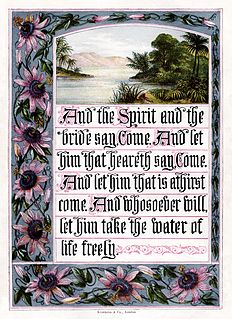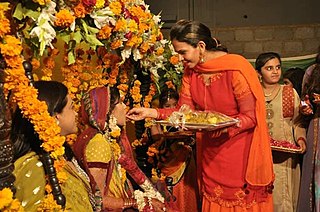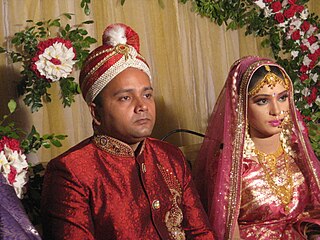
A wedding is a ceremony where two people are united in marriage. Wedding traditions and customs vary greatly between cultures, ethnic groups, religions, countries, and social classes. Most wedding ceremonies involve an exchange of marriage vows by a couple, presentation of a gift, and a public proclamation of marriage by an authority figure or celebrant. Special wedding garments are often worn, and the ceremony is sometimes followed by a wedding reception. Music, poetry, prayers, or readings from religious texts or literature are also commonly incorporated into the ceremony, as well as superstitious customs.

A bride is a woman who is about to be married or who is newlywed.
A dowry is a payment, such as property or money, paid by the bride's family to the groom or his family at the time of marriage. Dowry contrasts with the related concepts of bride price and dower. While bride price or bride service is a payment by the groom, or his family, to the bride, or her family, dowry is the wealth transferred from the bride, or her family, to the groom, or his family. Similarly, dower is the property settled on the bride herself, by the groom at the time of marriage, and which remains under her ownership and control.
Levirate marriage is a type of marriage in which the brother of a deceased man is obliged to marry his brother's widow. Levirate marriage has been practiced by societies with a strong clan structure in which exogamous marriage is forbidden. It has been known in many societies around the world.

Turkish coffee is a style of coffee prepared in a cezve using very finely ground coffee beans without filtering.

In Islam, marriage is a legal contract between two people. Both the groom and the bride are to consent to the marriage of their own free wills. A formal, binding contract – verbal or on paper – is considered integral to a religiously valid Islamic marriage, and outlines the rights and responsibilities of the groom and bride. Divorce in Islam can take a variety of forms, some executed by a husband personally and some executed by a religious court on behalf of a plaintiff wife who is successful in her legal divorce petition for valid cause.
A Hindu wedding, also known as Vivaha, Lagna (लग्न), or Kalyanam (कल्याणम्), is the traditional wedding ceremony for Hindus. The wedding ceremonies are very colourful, and celebrations may extend for several days. The bride's and groom's home—entrance, doors, wall, floor, roof—are sometimes decorated with colors, flowers, and other decorations.
Sororate marriage is a type of marriage in which a husband engages in marriage or sexual relations with the sister of his wife, usually after the death of his wife or if his wife has proven infertile. The opposite is levirate marriage.

Dower is a provision accorded by law but traditionally by a husband or his family, to a wife for her support should she become widowed. It was settled on the bride by agreement at the time of the wedding, or as provided by law.
Watta satta or shighar, is an exchange marriage common in Pakistan and Afghanistan.
Arranged marriage is a tradition in the societies of the Indian subcontinent, and continue to account for an overwhelming majority of marriages in the Indian subcontinent. Despite the fact that romantic love is "wholly celebrated" in both Indian mass media and folklore, and the arranged marriage tradition lacks any official legal recognition or support, the institution has proved to be "surprisingly robust" in adapting to changed social circumstances and has defied predictions of decline as India modernized.

The bride of Christ or the lamb's wife is a term used in reference to a group of related verses in the Bible, in the Gospels, Revelation, the Epistles and related verses in the Old Testament. Sometimes, the bride is implied by calling Jesus a bridegroom. For over 1500 years, the Church was identified as the bride betrothed to Christ. However, there are instances of the interpretation of the usage varying from church to church. Most believe that it always refers to the church.

Sister exchange is a type of marriage agreement where two sets of siblings marry each other. In order to get married, a man needs to persuade his sister to marry the bride's brother. It is practised as a primary method of organising marriages in 3% of the world's societies: in Australia, Melanesia, Amazonia and Sub-Saharan Africa; and can replace other methods in 1.4% of the societies.
Iranian wedding, also known as Persian wedding, consists of traditions that go back to Zoroastrianism, which was the main religion of pre-Islamic Iran, and although the concepts theories of marriage have been changed by Islamic traditions, the ceremonies have remained more or less the same as they were originally in pre-Islamic Iran. Although modern-day Iran is a multi-ethnic country, Iranian wedding traditions are observed by the majority of ethnic groups in Iran.

Marriage in Pakistan pertains to wedding traditions established and adhered by Pakistani men and women. Despite their local and regional variations, marriages in Pakistan generally follow Islamic marital jurisprudence. Culturally, marriages are not only seen as a union between a husband and a wife, but also an alliance between their respective families. These traditions extend to other countries around in the world where Overseas Pakistani communities exist.

Punjabi wedding traditions are a strong reflection of Punjabi culture with ritual, song, dance, food, and dress that have evolved over centuries.

Bengali Hindu wedding refers to the traditional Bengali wedding, usually with Hindu rites and rituals native to the Indian subcontinent.

Indian wedding clothes are elaborate set of clothes worn by the bride, bridegroom and other relatives attending the wedding.

Muslim marriage and Islamic wedding customs are traditions and practices that relate to wedding ceremonies and marriage rituals prevailing within the Muslim world. Although Islamic marriage customs and relations vary depending on country of origin and government regulations, both Muslim men and women from around the world are guided by Islamic laws and practices specified in the Quran.
Bahaghara is a wedding ceremony performed by Odia Hindu people in the Indian state of Odisha. There are subtle differences in the rites observed by different castes. In Odia marriage rituals, the mother of the bridegroom does not take part in the ceremony. The Utkala Brahmins have their weddings only in the daytime, preferably at midday or in the morning, while the other caste weddings are done during the evening or night. There is the custom of sending betel nuts to family friends for inviting them to the marriage. The first invitation is sent to the family deity as a respect to the lord. Marriages in Odisha are mostly fixed and arranged by the parents. Marriages for serving or capturing is not common. In the Odia community widow remarriage is allowed in some lower caste, in this case the younger brother is allowed to marry the deceased brother's wife. The marriage happens in three major rituals, Nirbandha, Bahaghara (wedding) and Chauthi (Chaturthi) (consummation). A marriage is not considered complete or valid until consummation. These rituals are performed either at the Duara or Tola kanias house.











